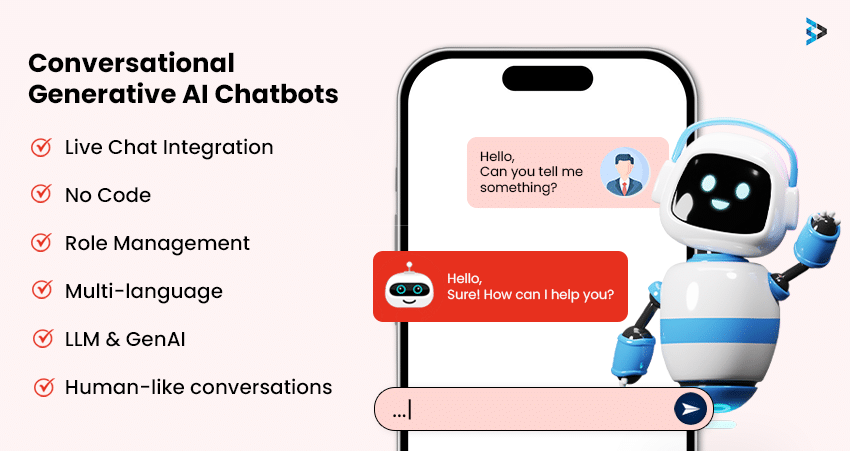The current generation is surrounded by generative AI, which changes the ways of developing ideas, generating content, and automating everything. Having your Adobe Commerce store is a unique advantage to leverage all the possibilities of this innovative technology to increase sales, enhance customer experiences, and stand out from the competitors. Partnering with an AEM development company can further optimize these AI-driven capabilities, ensuring seamless integration and enhanced digital experiences. In this blog post, we will discuss the interesting prospects that can be achieved when using generative AI in your Adobe Commerce.
What is Generative AI?
Another significant classification is generative AI, which is especially useful in the e-commerce sphere; this type of AI independently generates new data or an image using the principles of machine learning. Finally, in the online retail domain, Generative AI is transforming the mode of content production and improving customer experience and individualization. This technology produces exact fits of gainful products as well as controls the search mechanisms and marketing campaigns, thus resulting in an enhanced and specific shopping experience.
In summary, the use of Generative AI makes it possible to forecast customer behavior, simplify business operations, and enhance customers’ experience, leading to increased business sales and, hence, overall success. Thus, the applicability of Generative AI in retail settings represents a new paradigm of post-optimization, more effective, and customer-specific communications.
Features of Generative AI:
The following are the features of Generative AI that help in AI-powered marketing:
| Feature | Description |
| Automated Content Creation | Generative AI can generate multiple types of content within a short span of time using social media messages, product descriptions, and personalized marketing content, which ultimately increases customer interaction and sales. |
| Personalization at Scale | With this technology, it is now possible to satisfy customers’ need for unique personal experiences and, therefore, unique products in general. Nike has a personalization platform, and Shutterfly has an AI-generated design service, for example. |
| Improved Customer Experience | In terms of personalization, such as bespoke promotions, real-time pricing, and recommendation generation, generative AI theatrically reframes consumer engagement. Due to it, it improves the general purchasing experience, loyalty and client satisfaction. |
| Innovative Product Development | The generative AI aids in demand forecasting, positioning, optimal inventory, and new product design by analyzing customers’ wants and highlighting the current market demand. This fosters innovation and fuels the development of successful products. |
| Efficiency and Cost Reduction | It reduces the expenses on manpower, decreases working hours, and makes more efficient organizational resources for important decision-making processes involved in the organization’s operations, like managing inventories, responding to customer inquiries, or creating content. |
Impact of Generative AI in E-commerce

As it again has been summarized in this paper, Generative AI has brought so many benefits to companies and e-commerce that it has actually revolutionized this branch of business. The Impact of generative AI in e-commerce are as follows:
Improved Customer Experience and Conversion Rate
It has completely revolutionized the e-commerce market through the ability to evaluate the client’s behavior, desires, and purchasing patterns that generative AI grants companies to offer personalized customer experience. Through the use of this sophisticated tool, the chances of optimizing conversion can be improved by studying the consumer’s needs. Generative AI can help to create and tailor marketing strategies, content promotional campaigns, and product recommendations for customers, which will enhance general consumer satisfaction.
Savings and Automation
The ability to devise generative AI in e-commerce that can create dynamic content automatically is one of the primary benefits for businesses. In removing the need to add new content physically, this automation helps enterprises to put out new content and, at the same time, cut costs, time, and effort. By using a generative AI solution, e-commerce businesses may obtain high-quality product images, videos, and descriptions for the products with minimal effort and at less cost as compared to other conventional means of content creation.
Predictive Analytics and Streamlined Operations
Predictive analytics refers to the use of various tools and methods for studying past information to make accurate predictions about future Consumer trends. Generative AI makes many operations, such as taking orders, controlling inventory, dispatching goods, and fulfilling orders, easier, allowing customers to have a seamless shopping experience. Generative AI of demand by predicting and analyzing past data and market patterns to help companies maintain the right amount of inventory. Since the products are always there when required, there are gains in operational and customer values.
Generative AI and E-commerce: A Perfect Match
AI has entirely revolutionized e-commerce; 78% of businesses have increased sales after opting for AI-based personalization. AI is a great enhancement for the online buying process and encourages scientific progression in many fields, such as content development and intelligent recommendation tools.
Simplified Generation of Content
Creating high-quality content is crucial to e-commerce as it captures and engages the audience’s attention. Dynamic content generation requires a lot of tedious work that can be realized using generative AI, which will save time and money. Web page text, blog posts, social network posts, and even individual e-mail can be generated by AI to ensure a perfect match in all forms of text.
Personalized Product Search and Recommendations
Another advantage of generative AI for e-commerce is the opportunity to provide personalized recommendations and searches. AI algorithms can recommend products and services based on behavior and buying patterns, as well as customers’ website visits. This benefits the client through likely conversions and repeat business, thus enhancing the chances of conversions.
SEO-Friendly Product Descriptions
E-commerce businesses should ask for search engine optimization, or SEO, to be listed at the top of these results and attract additional users. Generative AI can also help develop product descriptions that are enriched with keywords related to an SEO agency’s specific area of specialization. These enticing and informative descriptions enable customers to make sound purchase decisions.
Moreover, the integration of generative SEO techniques allows businesses to leverage AI-driven content strategies that enhance search visibility. By generating unique, engaging, and keyword-optimized product descriptions at scale, generative SEO ensures that e-commerce stores rank higher on search engines, attract organic traffic, and improve overall discoverability.
Smart Search
Customers may feel that classical search instruments in e-commerce are limiting and frustrating since they utilize keyword-based search. This is boosted by generative AI intelligent search that understands the question you asked, working like a search engine to find relevant results. With the help of this feature, customers can enter general terms, such as ‘comfortable cotton t-shirt,’ to look for products.
Smart Product Suggestion
With the help of generative AI, powerful recommendation systems can be developed, going beyond the basic principles of a simple collaborative filter. AI algorithms can then use customer behavior or past purchase history to suggest what products would be of interest to provide targeted advertising to their customers. This benefits the client and increases their chances of turning into loyal customers and returning clients.
Localize Website Experience
To generate specific product descriptions, marketing messages, and website copy that would suit each client’s needs and cultural context, generative AI models can analyze user preferences, web activity, and peculiarities. Companies that personalize the web use get a 10-15% increase in sales. Unlike Lani’s vision of the online experience that may alienate the targeted population, this kind of localization may make it easier for businesses to connect with their audience, hence generating more traffic and sales to the sites and, ultimately, customer loyalty.
Personalization With Omnichannel
Another characteristic of an e-commerce platform is that the omnichannel idea is suitable to be accompanied by generative AI algorithms so that the firms can offer the clients a truly unified experience across multiple points of contact. AI-based systems can create personalized product suggestions, AI-driven pricing strategies, and content with the customer’s interest based on the information they acquire from customers’ history in browsers, past purchases, and social media platforms they attend.
AI Chatbot
Conversational AI chatbots, which are now built based on generative models, are now an essential part of the e-commerce automation process, providing customers with constant support, answering questions, and assisting with pick-up and selection of the products and their purchase. These AI assistants enhance the overall experience of customers and reduce working pressure on the teams of human customer support as these AI assistants can facilitate and handle simple conversations with customers in natural language, can understand the context of the conversation, and can provide efficient solutions.
New Product Design
E-commerce automation and product design are the two types of directions that may be of great assistance to e-commerce businesses with the help of generative AI development services. AI can come up with new product ideas through customer and market analysis and prompt the designer to apply changes through analysis of design patterns. This assists the business organizations in knowing the extent to which clients’ needs are being met and how various segments of the e-commerce business can be made more efficient through automation.
Improving Supply Chain Management
Advanced Generative AI in the supply chain is a critical aspect that supports the improvement of e-commerce, ranging from demand forecasting/ inventory management, logistics/ supply chain planning, and supplier management. This assists e-commerce companies in making the right decisions and minimizing resource wastage. Machine learning algorithms work on extensive data inputs, analyze huge volumes, and deliver solutions and patterns, enhancing operational efficiencies and cutting costs.
Voice Shopping
Integrated with voice assistants, generative AI is used to perform voice shopping, which implies that users can make orders, search for particular products, and receive recommendations. Namely, the popularity among buyers, especially tech-savvy ones, with a hands-free, conversational approach to shopping is vigorously increasing. This gives e-commerce businesses the excellent opportunity to differentiate themselves from their competitors and enhance their interaction with customers.
Language Translation
By leveraging generative AI models, businesses may extend the scope of the audience that can benefit from their products and deliver services to the international level due to the seamless translation of e-commerce content like descriptions, reviews, etc. This language translation feature enhances the ease of operation as well as the confidence and trust of the foreigners doing business with the company, thus increasing the company’s revenue and sales.

How Adobe Commerce Integrates with Generative AI
Adobe Sensei Gen AI’s collection is a set of AI tools designed to extend Adobe’s platform’s ability, which makes Adobe Commerce Development and Generative AI complementary. Organizations can integrate the existing AI technology into their operations in the following ways. Adobe Commerce has now integrated with Adobe Sensei GenAI, and thereby, the platform’s strong AI can now be used by businesses.
- Workflow: It is comforting to know that GenAI will integrate with Adobe Commerce to ensure that companies do not have to alter any of the processes they engage in as they involve the new AI functions. This integration minimizes the need for a complete system change.
- Data-Driven Personalization: Consumer trends are pivotal in shaping market strategies. GenAI enables Adobe Commerce to deliver tailored content across multiple platforms by leveraging customer data. This enhances customer satisfaction through personalized product descriptions, marketing content, norms, and recommendations.
- Content Automation: Integrating Generative AI with Adobe Commerce for your PIM and OMS solution enables the automation of content creation and enhancement. This automation streamlines tasks like content generation, significantly boosting the efficiency of these activities.
- Increased Productivity: Thus, the application of Generative AI improves the workload by automating certain platform operations. This boosts efficiency, given that firms are left to address essential concerns as programmers handle trivial tasks.
- Developer Tools and APIs: Adobe Commerce offers more settings that help in further customization and interaction with certain Generative AI models; there are developer tools and APIs. Due to this flexibility, firms are able to directly specify the requirements of AI systems based on their own needs.
Challenges
With the further expansion of e-commerce business, the application of AI technologies, including generative AI, also has advantages as well as risks. The following are some significant obstacles that e-commerce companies could run into while using generative AI:
- Data Privacy: With the application of generative AI in healthcare or any other line of business, there are severe problems with the privacy of data. Thus, the members of e-commerce businesses interested in training generative AI models should consider the benefits of using AI into account with strict data protection legislation, including GDPR. As such, there is still the utmost need to ensure that the consumer data is well anonymized as well as protected.
- High Investment: Organizing generative AI systems requires a significant initial investment in data tools, computing power, and skilled AI personnel. Some may be expensive, especially for online businesses with a small clientele. AI also requires regular updates, which consist of expensive algorithms for improving the model and keeping it up to date.
- Integration: One of the significant challenges of putting into practice the generative AI is usually the congruence in fitting it in currently developed e-business platforms and logistical structures. For the AI systems to be able to create recommendations and related content, first, the product data, client details, and sales history needs to be ingested into the system. As is well known, maintaining a high-quality customer experience is critical. Adobe Commerce integrations are needed for such challenges.
- Data Quality: This means that no generative AI model can be better than the kind of data used in training the model. Three common issues related to data from e-commerce are contamination of data, unrepresentativeness of data, and missing data. It is also essential to be sure that AI models generate accurate, relevant, and unbiased information and suggestions when developing and applying AI-driven programs; therefore, data curation and data cleaning are critical to achieving the intended goal.

The Future of AI in E-commerce

Conditions that are currently expected to be friendly towards the growth of e-commerce, as well as the automotive industry, include progressive technological developments, particularly in the field of artificial intelligence, which has tended to lower costs and enhance the customer experience. Applying generative AI involves the concept in the designing of automobiles, in the production lines and in engaging with customers.
Much of today’s Information technology applications, like virtual assistants, AI, software, robots, etc., can be used to operationalize organizational processes and activities, resulting in improved customer satisfaction. This is a great prospect for Generative AI in automobiles or another segment that may bring about organized efficiencies, innovation, and a happier customer base.
Conclusion
Adobe Commerce uses generative AI that opens up a world of opportunities to increase and develop your store. Real-time inventory tracking, content tailored to the user’s interest, and products that suggest themselves to the individual can all help to create a better experience for the customer, thus increasing sales and engagement. Adopt the possibility of marketing by referencing AI as a versatile, efficient strategy superior to competitors. Are you ready to leverage the generative AI to the maximum extent for your store with the help of Adobe Commerce Partner?
Read more: Crafting Perfection: AI’s Impact on the Jewelry Industry
FAQs
Generative AI is a class of artificial intelligence that is able to produce content and ideas of conversation and text stories, images, videos, and even music, starting from learning specific patterns and structures from the input data.
Some of the types of artificial intelligence being used in eCommerce include eCommerce chatbots for customer support, customer relationship management systems for buyer scoring, IoT adopted for digitizing retail, sales AI for process automation, product management, and image search, and customer support AI for answering simple questions.
Indeed, AI is influential in eCommerce, thus assisting customers via chatbots, providing wise searches, providing more personalized offers, and managing stocks and inventory.
AI is the future of eCommerce because it enables businesses to capture data in real-time to better understand the customer, adapt to his needs, and optimize various processes for more profound and efficient selling.
AI is another system for developing individual product suggestions. It evaluates the customer’s data, including previous purchases and the web traffic they follow, to provide recommendations based on data-mining approaches.
In general, the application of generative AI can improve customer experience on Adobe Commerce by generating specific product recommendations, creating dynamic content for product descriptions, and developing intelligent chatbots for customer support, improving their abilities to reply to clients in natural language.
Related Articles
-
See, Speak, Find: How AI is Changing How We Search Online
Remember the good old days of search? You’d type a few keywords into Google, hit Enter, and scroll through pages of blue links. Simple, right? Well, those days are quickly
-
Why is eSports Evolving as a Business Model with a 40 Percent Year-on-Year Growth?
eSports (electronic sports) has attracted the attention of gaming franchises and the younger audience in the past few years and continues to do so. If industry reports are to be
-
How Combination of BigCommerce and AI Helps E-commerce
In the rapidly changing e-commerce world, businesses constantly strive to enhance consumer experiences, generate more money as well as make their processes less complicated. BigCommerce is one of the leading




